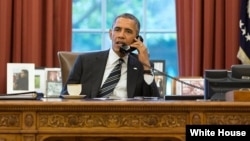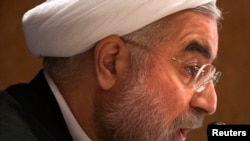WHITE HOUSE —
President Obama and Iran's president, Hassan Rouhani, have spoken by telephone, discussing efforts to resolve long-running international concerns over Iran's nuclear program. It was the first such contact in more than 30 years.
Obama revealed his phone call with President Rouhani at the beginning of a previously unscheduled appearance in the White House briefing room.
"I reiterated to President Rouhani what I said in New York. Although there will surely be important obstacles to moving forward and success is by no means guaranteed, I believe we can reach a comprehensive solution," said President Obama.
A senior administration official said the White House received word Friday morning that Rouhani wanted to talk with President Obama before the Iranian leader departed New York.
The approximately 15-minute phone conversation was "cordial" and conducted through interpreters, with President Obama beginning by congratulating Rouhani for his victory in Iran's election.
The administration official said the White House had also noticed President Rouhani's tweets to Obama, which expressed gratitude for his hospitality and the phone call.
President Obama said he and the Iranian leader directed their teams to "continue working expeditiously" in cooperation with the P5+1 group of nations to pursue an agreement.
Even with the history of mistrust between the U.S. and Iran, Obama said, steps taken so far could offer hope for resolving the dispute over Iran's nuclear program.
"We are mindful of all the challenges ahead. The very fact that this was the first communication between an American and an Iranian president since 1979 underscores the deep mistrust between our countries, but it also indicates the prospect of moving beyond that difficult history," said Obama.
Iran has always denied that the program is aimed at developing a nuclear weapon. It has faced increasingly harsh economic sanctions designed to pressure it to meet international obligations.
Obama again mentioned a "fatwa" by Iran's supreme leader Ayatollah Khameini against the development of nuclear weapons, and a similar pledge by President Rouhani to the world body.
He said the United States respects the right of Iran to access peaceful nuclear energy, in the context of Iran meeting its obligations.
Obama said there is "a basis for resolution," but that the test of Iran's commitment will be meaningful, transparent and verifiable actions that could also bring Iran relief from economic sanctions.
"A path to a meaningful agreement will be difficult and at this point both sides have significant concerns that will have to be overcome, but I believe we have a responsibility to pursue diplomacy and we have a unique opportunity to make progress with the new leadership in Tehran," he said.
The administration official said President Obama would engage in additional direct contacts with Rouhani if it would be helpful in resolving the Iranian nuclear issue.
The official indicated that the meeting in New York between Secretary of State John Kerry and Iran's foreign minister created a "positive environment" for the phone call.
The official said the U.S. has been in touch with other governments about the conversation, including Israel and Gulf nations, and with members of Congress.
The official said Israel has "every right to be skeptical" given the history of inflammatory statements by Iran, but that the U.S. is trying to achieve an objective that would serve the security interests of the U.S., Israel and world.
On Capitol Hill, House of Representatives Foreign Affairs Committee Chairman Ed Royce credited "damaging sanctions" for getting the Iranian leader on the phone with Obama, adding that pressure must be maintained.
Obama also spoke about what he called a "major diplomatic breakthrough," the path toward an expected United Nations Security Council vote on a binding resolution to place chemical weapons under international control.
Obama revealed his phone call with President Rouhani at the beginning of a previously unscheduled appearance in the White House briefing room.
"I reiterated to President Rouhani what I said in New York. Although there will surely be important obstacles to moving forward and success is by no means guaranteed, I believe we can reach a comprehensive solution," said President Obama.
A senior administration official said the White House received word Friday morning that Rouhani wanted to talk with President Obama before the Iranian leader departed New York.
The approximately 15-minute phone conversation was "cordial" and conducted through interpreters, with President Obama beginning by congratulating Rouhani for his victory in Iran's election.
The administration official said the White House had also noticed President Rouhani's tweets to Obama, which expressed gratitude for his hospitality and the phone call.
President Obama said he and the Iranian leader directed their teams to "continue working expeditiously" in cooperation with the P5+1 group of nations to pursue an agreement.
Even with the history of mistrust between the U.S. and Iran, Obama said, steps taken so far could offer hope for resolving the dispute over Iran's nuclear program.
"We are mindful of all the challenges ahead. The very fact that this was the first communication between an American and an Iranian president since 1979 underscores the deep mistrust between our countries, but it also indicates the prospect of moving beyond that difficult history," said Obama.
Iran has always denied that the program is aimed at developing a nuclear weapon. It has faced increasingly harsh economic sanctions designed to pressure it to meet international obligations.
Obama again mentioned a "fatwa" by Iran's supreme leader Ayatollah Khameini against the development of nuclear weapons, and a similar pledge by President Rouhani to the world body.
He said the United States respects the right of Iran to access peaceful nuclear energy, in the context of Iran meeting its obligations.
Obama said there is "a basis for resolution," but that the test of Iran's commitment will be meaningful, transparent and verifiable actions that could also bring Iran relief from economic sanctions.
"A path to a meaningful agreement will be difficult and at this point both sides have significant concerns that will have to be overcome, but I believe we have a responsibility to pursue diplomacy and we have a unique opportunity to make progress with the new leadership in Tehran," he said.
The administration official said President Obama would engage in additional direct contacts with Rouhani if it would be helpful in resolving the Iranian nuclear issue.
The official indicated that the meeting in New York between Secretary of State John Kerry and Iran's foreign minister created a "positive environment" for the phone call.
The official said the U.S. has been in touch with other governments about the conversation, including Israel and Gulf nations, and with members of Congress.
The official said Israel has "every right to be skeptical" given the history of inflammatory statements by Iran, but that the U.S. is trying to achieve an objective that would serve the security interests of the U.S., Israel and world.
On Capitol Hill, House of Representatives Foreign Affairs Committee Chairman Ed Royce credited "damaging sanctions" for getting the Iranian leader on the phone with Obama, adding that pressure must be maintained.
Obama also spoke about what he called a "major diplomatic breakthrough," the path toward an expected United Nations Security Council vote on a binding resolution to place chemical weapons under international control.






